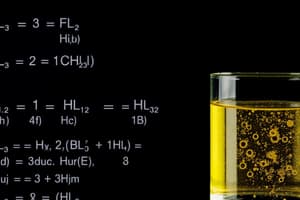Podcast
Questions and Answers
What is the primary focus of the scientific method?
What is the primary focus of the scientific method?
- Formulating hypotheses and testing them (correct)
- Refining hypotheses based on observations
- Making observations and drawing conclusions
- Conducting experiments and analyzing data
Which subfield of chemistry primarily focuses on the study of carbon-containing compounds?
Which subfield of chemistry primarily focuses on the study of carbon-containing compounds?
- Physical chemistry
- Analytical chemistry
- Inorganic chemistry
- Organic chemistry (correct)
What distinguishes inorganic chemistry from organic chemistry?
What distinguishes inorganic chemistry from organic chemistry?
- Inorganic chemistry deals with microscopic properties, while organic chemistry focuses on macroscopic properties
- Inorganic chemistry focuses on single elements, while organic chemistry focuses on compounds
- Inorganic chemistry involves the study of non-carbon compounds, while organic chemistry focuses on carbon-containing compounds (correct)
- Inorganic chemistry uses analytical methods, while organic chemistry uses synthesis methods
What aspect of matter and its transformations does analytical chemistry primarily focus on?
What aspect of matter and its transformations does analytical chemistry primarily focus on?
What is the main focus of physical chemistry?
What is the main focus of physical chemistry?
Which type of reaction involves the breaking down of a single reactant into two or more simpler substances?
Which type of reaction involves the breaking down of a single reactant into two or more simpler substances?
What is the balanced chemical equation for the synthesis reaction where hydrogen gas reacts with oxygen gas to form water?
What is the balanced chemical equation for the synthesis reaction where hydrogen gas reacts with oxygen gas to form water?
Which branch of science is mentioned as the foundation of the modern world?
Which branch of science is mentioned as the foundation of the modern world?
What do chemical equations show?
What do chemical equations show?
Which area of study in physical chemistry involves the study of thermodynamics and kinetics?
Which area of study in physical chemistry involves the study of thermodynamics and kinetics?
Flashcards
Science
Science
The systematic and logical study of the natural world, including the physical world, its laws, and governing processes.
Scientific Method
Scientific Method
A process of inquiry used in science that involves making observations, formulating hypotheses, testing them, and refining hypotheses based on results.
Chemistry
Chemistry
The branch of science that investigates matter and how it changes.
Organic Chemistry
Organic Chemistry
Signup and view all the flashcards
Inorganic Chemistry
Inorganic Chemistry
Signup and view all the flashcards
Analytical Chemistry
Analytical Chemistry
Signup and view all the flashcards
Physical Chemistry
Physical Chemistry
Signup and view all the flashcards
Chemical Reactions
Chemical Reactions
Signup and view all the flashcards
Synthesis Reaction
Synthesis Reaction
Signup and view all the flashcards
Decomposition Reaction
Decomposition Reaction
Signup and view all the flashcards
Study Notes
Science: The Foundation of Modern World
Science is a systematic and logical approach to the study of the natural world. It provides essential knowledge about the physical world, its laws, and the processes that govern it. The scientific method is a process of inquiry that involves making observations, formulating hypotheses, testing them, and refining the hypotheses based on the results.
The three most prominent branches of science are physics, biology, and chemistry. However, in this article, we will focus on the topic of chemistry, chemical reactions, and equations.
Chemistry: The Study of Matter and Its Transformations
Chemistry is the branch of science that deals with the study of matter and its transformations. It is the study of substances and processes that occur at a molecular and atomic level. Chemistry is divided into several subfields, including organic chemistry, inorganic chemistry, analytical chemistry, and physical chemistry.
Organic chemistry is the study of carbon-containing compounds and their reactions. It involves the synthesis of organic compounds, understanding their structures and reactions, and their characteristics and applications.
Inorganic chemistry is the study of all elements and compounds that are not carbon-containing. It involves the synthesis, properties, reactions, and structures of inorganic compounds.
Analytical chemistry is the study of the separation, identification, and quantification of substances. It uses various techniques to analyze the chemical composition of substances and determine their properties.
Physical chemistry is the study of the physical properties and behavior of substances. It involves the study of thermodynamics, chemical equilibrium, kinetics, and spectroscopy.
Chemical Reactions and Equations
Chemical reactions are processes that involve the transformation of one or more substances into one or more different substances. Chemical reactions occur when the molecules of the reactants break down into simpler substances, known as products. Chemical reactions are classified into two types: synthesis reactions and decomposition reactions.
Synthesis reactions involve the formation of a product from two or more reactants. For example, when hydrogen gas reacts with oxygen gas to form water, it is a synthesis reaction. The balanced chemical equation for this reaction is:
$$2H_2 + O_2 \rightarrow 2H_2O$$
Decomposition reactions involve the breaking down of a single reactant into two or more simpler substances. For example, when potassium chlorate decomposes into potassium chloride and oxygen gas, it is a decomposition reaction. The balanced chemical equation for this reaction is:
$$2KClO_3 \rightarrow 2KCl + 3O_2$$
Chemical reactions are represented using chemical equations, which show the reactants, the products, and the chemical changes that occur. These equations use chemical formulas to represent the substances involved in the reaction.
In conclusion, science is the foundation of modern world, and chemistry is one of its most important branches. Chemical reactions and equations provide a way to understand and predict the behavior of substances, leading to the development of new technologies and innovations.
Studying That Suits You
Use AI to generate personalized quizzes and flashcards to suit your learning preferences.
Description
Test your knowledge of chemistry, chemical reactions, and equations with this quiz. Explore the different types of chemical reactions, their balanced equations, and the fundamental principles of chemistry.




